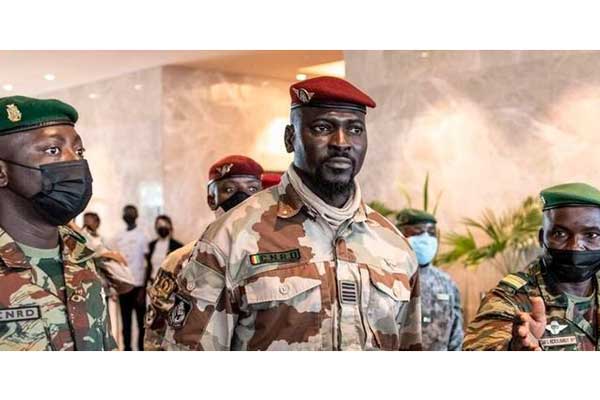Guinea PM offers rare rebuke to junta over airport renaming

Lieutenant Colonel Mamady Doumbouya (centre), the Guinean coup leader. PHOTO | AFP
What you need to know:
- Guinean media have also suggested there is a growing rift between Beavogui and Guinea's strongman Colonel Mamady Doumbouya.
Guinea's transitional prime minister has said he is "displeased and overwhelmed" at a decision to rename the country's international airport after ex-authoritarian president Sekou Toure, local media reported on Friday.
In a rare public criticism of the West African country's ruling junta, Mohamed Beavogui told local news site Mosaiqueguinee that he was not consulted about renaming the airport in the capital Conakry.
"I am surprised, displeased and overwhelmed," added the prime minister, whom the army appointed in October after seizing power in a coup the previous month.
Two aides to Beavogui, who both declined to be named, confirmed that the prime minister had made the remarks.
Guinean media have also suggested there is a growing rift between Beavogui and Guinea's strongman Colonel Mamady Doumbouya.
Doumbouya, a former Special Forces commander, launched a coup on September 5, ousting elected president Alpha Conde after months of brewing discontent against his government.
He then defied broad condemnation of the putsch and was sworn in as interim president on October 1.
The strongman has nevertheless promised to restore civilian rule after a transition period of unspecified length, and to unite the politically fractious nation of 13 million people.
He also appointed Beavogui, a civilian with a background in international development, as his transitional prime minister.
Beavogui's criticism of the junta comes after it announced on Thursday that it would rename the Conakry airport after Sekou Toure.
Toure's reputation is divisive, however.
He led Guinea to independence from France in 1958 and was initially acclaimed as a progressive leader. But Toure later ruled with an iron fist until his death in 1984.
Rights organisations say his regime was responsible for the death or disappearance of some 50,000 people.



